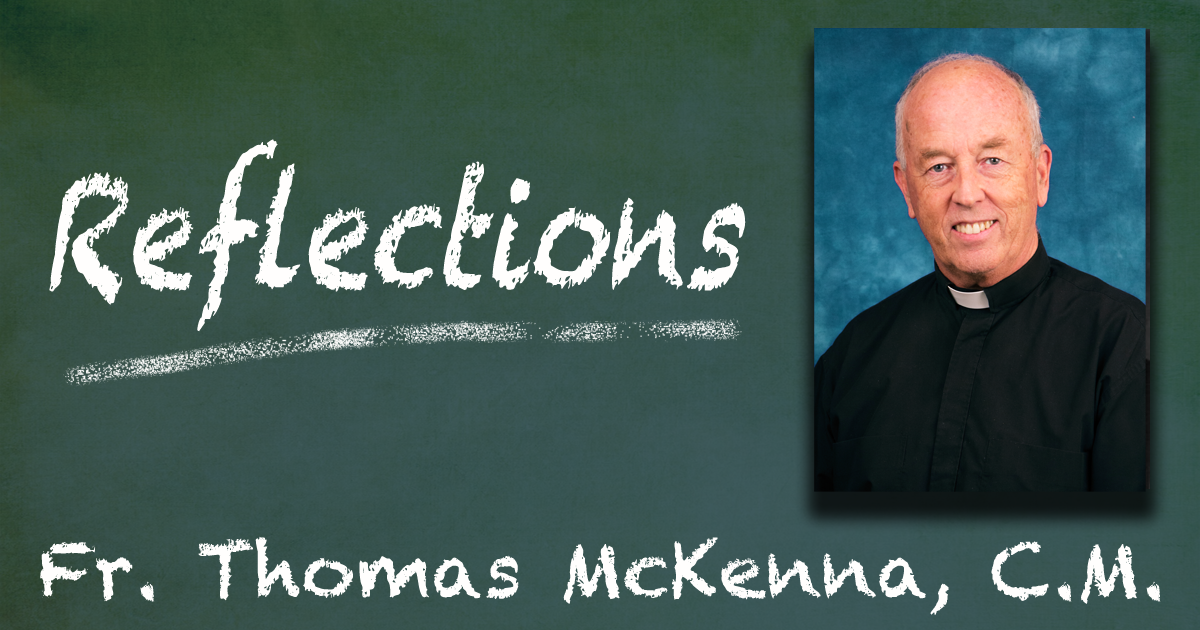
Sensing Grace
(Lk: 1:26-38)
The angel Gabriel reveals to Mary that she’s “full of grace.” And so the question, what is this “grace” that Mary is filled with? There are few better answers to be had than the one in the five words that follow. “The Lord is with you!”
Grace means God-with-us, God close up to us and inside us and all around us. It means the nearness and the company of God. To have it is to be filled up to the brim with the personal presence of God, the Spirit of God, God’s very own self.
You have a little taste of something like it when you feel yourself filled up with the personal presence of someone who loves you and whom you love back.
And that’s what’s behind the Church’s teaching that the Blessed Mother from her beginning was “Immaculate. It’s a hallowed formula for attesting that even from the outset, Mary’s person was filled with God’s own person; i.e., filled with grace. This was so much the case, the tradition says, that there was no “un-godness” in her – no what we’d know by another name as sin. As in “O Mary conceived without sin.”
And so, the Catholic Church all over the world celebrates this wonder – what one poet has called our “tainted nature’s solitary boast.”
But bringing this back to ourselves we can ask, what is this experience like, this “full of grace”? What might it be even to be only partially touched by grace, to have, in some degree or other, the experience of the nearness of God?
Indeed there are many different experiences people testify to – things like feeling yourself moved to do something totally selfless, or forgiving someone from the heart, or getting lost in the beauty of a sunset. But I pick out one that’s suggested by a certain other word in the Gospel reading, “overshadowed.” As in, “The power of the most high will overshadow you.”
It’s an expression that appears in some key incidents in the Hebrew Testament where God powerfully and mercifully “shows up.” Perhaps the most dramatic is the one with Moses going up to get the Ten Commandments, climbing up this trembling mountain covered over (overshadowed) with clouds and smoke and lightning. Also in the desert, there’s the cloud by day and the fire by night that overshadows the pilgrims – signs of God’s guidance. And still later there’s the cloud covering the Ark of the Covenant, God walking along with his people on their journey. Overshadow: it’s God close by, God drawing near. It’s Grace.
What could this sort of encounter be like? Years ago, I heard someone refer to an experience like this using the phrase, “hovering close.” It came from a woman who had been released from the hospital after a serious illness, and she told of a visit from a friend while there. The two got into a conversation about God, and this very sick and desperate woman in the bed asked, “Where is God in all this?” I feel so all alone.” The friend looked down to think for a minute, and then said something the other never forgot. “God is here in this room, feeling your pain – God is ‘hovering close’ over your bed.”
It was that expression, “hovering,” that got to her – and stuck with her ever since. God was this tender shadow, this near and comforting presence, compassion itself standing by and over the bedside. This was not hovering in the usual sense of “butting in,” being intrusive like a helicopter parent. But it was hovering in the psalmist’s sense of the servant woman who “keeps her eyes on the hands of her mistress,” ready to respond, to jump in at the slightest sign she’s needed.
Or, in the celebrated phrase of this story today, this is “the handmaid of the Lord,” the one waiting close by and poised to serve, to help and to heal.”
Hovering as compassionate care.
And so, where might we have seen or felt such a thing? Perhaps,
– in the care and guidance someone gave you – or continues to give you?
– in the heart-warming knowledge of somebody else’s always “being there,” really wanting the very best for you and willing to give most anything for it?
– in the compassion of another for your weaknesses and failings?
– in your own “draw” to Vincent and Louise’s caring outreach to the outcasts?
Hovering. It’s God saying “I will be with you. I will be grace for you.”
Something similar to this came through in a piece I once read on the calling of a hospice worker.
“These caregivers make the love of God effective, bending over pain and distress at a most critical moment of human life. In doing so, they embody in a beautiful and real sense the mystery of divine compassion.”(Elizabeth Johnson, Abounding in Kindness, p. 154). In these privileged moments, they open a person to the presence of grace, to the nearness of God.
We celebrate the reality and working and the presence of grace. We see this fully in Mary of Nazareth. But I think we’ve also glimpsed it at different times in our own lives: as that all-comforting cloud surrounding us, full of care and healing and direction and meaning and strength – and at a time we needed it.
Grace. It’s the compassionate overshadowing of God coming (better, pouring) into our lives.







Thank you for this reflection